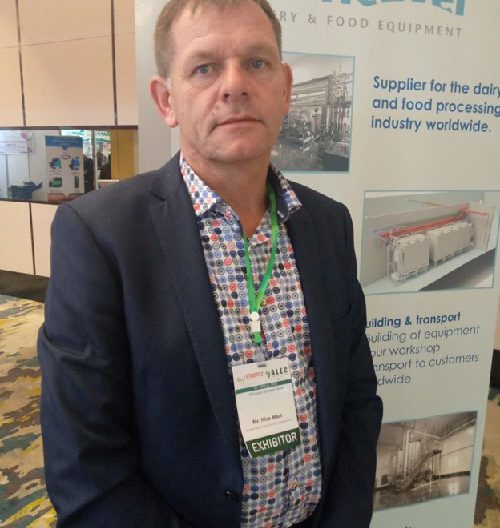
BY HAFTU GEBREGZIABIHER
Nico Maat is from the Netherlands representing the company for dairy products processing equipment supplier Van den Heuvel Dairy & Food Equipment.
Nico Maat, who studied agriculture at a middle school, has joined the company that he now manages and owned for the past 30 years. The Van den Heuvel Dairy & Food Equipment has specialized in the supply of production lines for the dairy and liquid food processing industry. In the Netherlands, Nico Maat has been in Addis Ababa. He had taken part at the 11th Ethio poultry expo (Ethiopex) and the 7th African livestock exhibition and congress (ALEC), last week.
The company enjoys a world-wide reputation for carrying out the most advanced international projects. “All our equipment, from single components to entire production lines, comprises of custom-made expert work and complies with the latest European directives. So I really learned a lot in the company,” Maat told The Ethiopian Herald during an exclusive interview recently at an international dairy and poultry farm exhibition in Addis Ababa.
“I developed skills and the situation brought me to where we stand now. That means as a dairy equipment supplying company, we have knowledge of the market and the needs, and that›s why we can transform the situation of Ethiopia to a better future,” the Netherlands investor believed.
We are exporters of this equipment and we are used to supply to various African countries. So this is the reason to come also to Ethiopia for this event- recently concluded dairy and poultry farm exhibition organized by the Embassy of The Netherlands and NSV.
The initiative started through the Embassy of the Netherlands with some program and “we the investors have already contact here. For our case, we have one plant in Sululta and we want to widen our customers range in Ethiopia.”
“We have been active in the business in Ethiopia for six years. We are also coming like annually to participate in trade fairs and exhibitions. The company is also planning to open office here so that we can work from our office in Ethiopia directly.”
According to him, the company has come up with items to the exhibition containing mainly pasteurizing units as well as flow pasteurizing, including the additional machines for meal treatment like separator and homogenizer. And further onwards in the lines, you have processing tanks for yogurt and drinking milk and finally you have filling machines, packaging machines to fill the product in packaging. And besides that, we have specialized also in cheese making equipment. So that is cheese fat and so on.
It is all the things someone can use in the dairy sector and all the products. I ran through the product line that you can visualize.
They›re a bit mixed like pasteurizing units, meal treatment, fermenting processing this down to more processing and also additional equipment like CIP units and butter making for making butter.
The other products are for cleaning. CIP stands for cleaning in place, which means that after use of the tankers in the machine, the equipment, you have to clean it because of the proteins that will stick on the machine. And you do that with such a unit.
Asked about actual business in Ethiopian, Niko Maat stated that the business in Ethiopia has the potential to attract investors from Europe, from North America and from other parts of the advanced world
“What I see here is a huge potential in the country with a huge population. So I think there is a lot that can be developed in the world of processing. I›m a supplier investor which is something else. However, I even believe that investors can be interested because of the huge potential of the country, the availability of land and presence of such a huge population as a market. Yes, I think so.”
That is the initiative that already takes place by the presence of the embassy in the closet market, the SNV network, that will all bring the business to a higher level, I think.
In Ethiopia, poultry production is one of the major sub-sectors that play an important role in improving family nutrition, creating job opportunities, and empowering women with economic opportunities.
Chickens (Doro) are the most popular poultry species used for meat and egg production in Ethiopia. Chicken and chicken products provide a valuable source of protein and income for families. The trends in the consumption of poultry products are key indicators of opportunities for investment. The total chicken population in the country is estimated to be 59.5 million with indigenous breeds representing 90.85%, hybrid chicken 4.76%, and exotic breeds 4.39% (CSA, 2016/2017).
The predominant proportion of national poultry meat and eggs is produced using local low-production breeds. However, non-native breeds in intensive production systems contribute to an increase in the production share.
The government set ambitious goals to transform the current poultry system with a plan to produce surplus eggs and poultry meat for export. According to the 10-year plan, egg production will reach 5.5 billion by 2029 from the current 2.8 million. The contribution of poultry meat to the total national meat consumption is also expected to increase from 9 to 30 percent currently by 2030.
The capacity of local poultry integrators is also increasing and an increasing number of foreign companies are establishing their base in Ethiopia like that of Maat’s company.
In this context, Ethiopia, in cooperation with the Ministry of Agriculture, the Embassy of the Kingdom of the Netherlands in Ethiopia, and the African Chamber of Commerce and Industry had organized the Ethiopian Poultry and Livestock Exhibition, which was launched at the Skylight Hotel in Addis Ababa last week, in the presence of senior government officials, experts, visitors and other stakeholders.
The Ethiopian Herald November 11/2022




